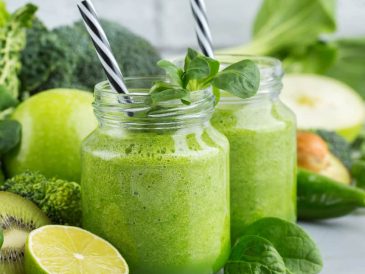It is silent and affects our health. Learning to identify it and acquire healthy habits to avoid it is life insurance.
I had been feeling for some time that I had little energy and great difficulty concentrating, with a mood that left much to be desired. I had become pessimistic and irritable and my digestion was becoming slow and heavy.
It simply seemed like a bad streak, a cluster of small annoyances that, apparently, had little to do with each other, and that I attributed to my own inability to manage certain emotions. However, my digestive problems made me go to a nutritionist who gave a name to what was happening to me.
“Chronic or low-grade inflammation,” he told me once we talked about my eating habits, my lifestyle, and my symptoms (and which he corroborated with my medical studies). I didn’t quite understand what these words meant, or in which area of my body there was inflammation and how it could be affecting such disparate areas of my health.
Table of Contents
What is chronic inflammation?
“Inflammation is a necessary reaction for our body. It is a mechanism through which the body acts in the face of aggression or a threat, which the immune system must confront. Like when you get hit, the area becomes inflamed because defense cells are coming to solve the problem. It is a process in which part of the resolution involves inflammation,” a health biologist and nutritionist, explained to me.
Although this is a necessary and healthy response, the problem begins when the process remains active, leading to a state of alert to the immune system and causing permanent inflammation known as low-grade, or chronic, which can damage different tissues over time. time and generate non-specific symptoms.
In fact, there are studies that link it with many chronic diseases, since it increases the risk of cardiovascular disease, cancer, diabetes, autoimmune disorders, depression and neurodegenerative diseases.
“We don’t know what causes it and maintains it, because it comes hand in hand with many small pro-inflammatory factors associated with lifestyle, which add up, causing the body to perceive constant threats,” says the expert.

Chronic inflammation affects longevity
Seeing that low-grade inflammation was not something to be taken lightly, I did extensive research into its implication on health. I wasn’t surprised to learn that it affects logevity. This is because it affects multiple functions of the body.
- It damages DNA, which increases the risk of cancer.
- It damages organs and tissues, even contributing to sarcopenia and osteoporosis.
- Damages the cardiorespiratory system .
- It deregulates the homeostasis of multiple hormones, promoting insulin resistance.
- It hinders the proper functioning of the immune system, increasing the risk of infections.
- It inhibits neurogenesis, which increases the risk of depression and neurodegenerative diseases.
What are the symptoms of chronic inflammation?
The list of symptoms can be infinite, although it usually has a lot to do with intestinal health in general: inflammation and digestive discomfort, recurrent infections – such as repeated candidiasis – as well as chronic pain or psychological alterations. of long evolution. Other symptoms that may be hiding low-grade chronic inflammation, in addition to those mentioned, are:
- Pain (joints, periods, migraines, etc.)
- Very common mucus or runny nose .
- Dry eyes.
- Skin with redness, irritated, itchy.
- Brain fog and/or excessive tiredness.
- Irritability or anxiety.
At this point, it is necessary to go to an expert to confirm whether or not we have chronic inflammation. “What tests should we request?” I ask the nutritionist, who states that the most important thing is the patient’s medical history, since the clinic will always tell us much more than the studies. “Medical studies are complementary tests that support the diagnosis. Therefore, spending enough time to assess how you are, what is behind your reason for consultation, and see what you need is a key first step. Now, by assessing markers of inflammation in analysis, we can support our suspicions and refine the recommendations to be prescribed.”
Pastor points out that in a blood test we must pay attention to a high CRP and ESR (note that it can increase in some women during their period), but we can also assess how homocysteine and fibrinogen are, if there has been an increase in transaminases or if we have high glycated hemoglobin, among others.
What foods to eat to avoid chronic inflammation?
For Pastor, the diet should be as personalized as possible, since, although there are foods that are very beneficial when it comes to reducing inflammation, at a given moment they may not suit us at all. “For example, broccoli is very rich in sulforaphane, an antioxidant with anti-cancer potential. But many patients, at certain moments of their digestive improvement, do not tolerate it very well.”

However, he points out that, within the variety that each person may need, there are some recommendations that we should all incorporate into our daily diet:
- Rich in antioxidants.
- Rich in seasonal vegetables and fruits.
- With enough fiber to pamper our microbiota.
- Varied in terms of the proteins that make up the dishes (alternating quality meats with fish, mollusks, eggs and quality vegetable protein such as lentils, azuki beans, nuts…).
- Prioritizing quality carbohydrates such as tubers, pseudocereals such as quinoa or buckwheat, as well as legumes and fruits, compared to the continued abuse of wheat and refined flours that we have today.
- With a good supply of omega-3 fat , from small oily fish several days a week (avoiding cans as much as possible), and including walnuts and ground flaxseed.
“Above all, try to follow a diet that is as natural as possible, complete, rich and varied With which you enjoy, satisfy you and cover your body’s needs, avoiding foods with long lists of ingredients, highly processed, sugars and/or sweeteners in your daily life,” recommends the nutritionist.
If we add to this a good rest, avoid a sedentary lifestyle by practicing sports, pamper our microbiota, learn stress management techniques, and stay away from toxins, we will have a better chance of preventing inflammation from becoming chronic.
“Trying to control everything is not feasible, sustainable or beneficial.” Just one more source of stress (and therefore, inflammation). What you can add and do will be great. Adapt to your current reality, and add the recommendations that you can follow,” concludes nutritionist.




